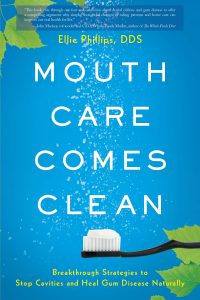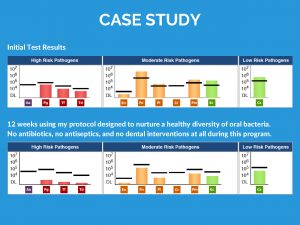 When OralDNA® testing indicates worrisome levels of periodontal pathogens, we may want to consider a dentally counter-cultural idea that can help avoid the need for aggressive antibiotics and antiseptics. Most dental professionals believe periodontal disease cannot be cured, yet a more holistic approach has been shown to overcome periodontal pathogens and may offer a way to avoid the continuous cycles of treatment to control re-infection. Our understanding of human bacteria changed as the Human Microbiome Project1 discovered our bodies house legions of useful bacteria, and many defend us from harmful ones.
When OralDNA® testing indicates worrisome levels of periodontal pathogens, we may want to consider a dentally counter-cultural idea that can help avoid the need for aggressive antibiotics and antiseptics. Most dental professionals believe periodontal disease cannot be cured, yet a more holistic approach has been shown to overcome periodontal pathogens and may offer a way to avoid the continuous cycles of treatment to control re-infection. Our understanding of human bacteria changed as the Human Microbiome Project1 discovered our bodies house legions of useful bacteria, and many defend us from harmful ones.
Antibiotics are used to kill bacteria, but the repeated and prolonged use of antibiotics can damage healthy digestive bacteria and upset the body’s immune system. Today, doctors limit antibiotic use and often suggest healthy probiotic bacteria to kick-start or improve health. Healthy mouths are populated with hundreds of species of helpful bacteria that contribute to mouth health, so we should consider these important bacteria, not ignore them or kill them indiscriminately.
The 1960s “flower power” symbol represented a counter-culture that promoted non-violent ideology. I’d like to use a flower analogy to illustrate the benefits of less aggressive techniques to control periodontal pathogens. Let’s imagine for example, periodontal pathogens as weeds in the mouth, and helpful bacteria are flowers and grasses. If your backyard sprouts a few weeds, I doubt you’ll spray a non-selective weed killer to eradicate every plant on your property. This could solve the weed problem, but the first returning intruders to a barren landscape will be the most resilient weeds. An effective strategy is to work selectively on the weeds, while preserving the lawn and plant barrier to block the return of future weeds.
Oral antibiotics and strong antiseptics (including chlorhexidine, sodium hypochlorite, and hydrogen peroxide) cause indiscriminate killing of oral bacteria. There are non-aggressive strategies that can effectively control periodontal pathogens, while nurturing healthy oral bacteria, to achieve great results. This is not a new concept and many countries employ childhood programs to nurture a healthy oral microbiome early in life2,3. Japanese studies show healthy bacteria colonize teeth when they erupt into a balanced oral ecology4. The goal is never to eliminate the mouth’s bacteria – but to develop a healthy diversity as a defense against caries, possibly for life5. In Finland, a 50-year-old public health program improves the oral ecology of preschoolers, prior to the eruption of adult molars6.
Some suggest we eradicate the oral biome and “replant” using a probiotic supplement. An oral probiotic is not the counterpart of an antibiotic, and this idea undervalues the unique richness of an individual’s natural bacterial diversity developed through generational contact.
Motivated patients routinely control oral pathogens without antibiotics or damaging antiseptics in 12-24 weeks using my “Four Keys to Oral Health”:
- Ideal Oral Care Products will strengthen teeth while nurturing the mouth’s overall ecosystem for total mouth health. Many oral care products target plaque bacteria, but damage healthy oral bacteria and upset the mouth’s ecology.
- Diet and Digestive Health impacts the quality of our saliva, and the quality of saliva influences oral health. A plant-diverse diet affects the composition of saliva. The use of digestive probiotics may improve the uptake of minerals from the foods we eat, for improved oral health.
- Immune System Health plays a vital role in the repair and support of our gums and teeth. Lymphatic circulation carries disease-fighting immune cells throughout our body, and we must ensure that immune cells reach the mouth to heal and fight gum and dental disease. Suggestions include a nutritious diet, vitamin supplementation, body movement, and the use of a toothbrush to stimulate lymphatic flow in the tissues around teeth.
- Lifestyle impacts mouth health on a minute-by-minute basis, as mouth health is dynamic. Daily habits create conditions that either improve or damage the health of our teeth and gums. We must critically evaluate the length of time the mouth experiences damage from acidity, versus the time we allow for repair through direct contact with saliva, the mouth’s healing liquid. An imbalance will create oral problems. We can improve mouth health by fasting between meals (even water dilutes saliva’s healing capacity). Xylitol at the end of meals will limit acidic damage, stimulate saliva flow, and promote a healthier oral ecology.
For an example, see image below. This is a MyPerioPath® pre & post measurement of a patient using a 12 week strategy designed to nurture a healthy diversity of oral bacteria. During this program, no antibiotics, no antiseptics, and no dental interventions were used. Developing a healthy ecology takes several months, and OralDNA® testing can confirm a sustainable outcome. For more visit: www.DrEllie.com.

- https://www.ncbi.nlm.nih.gov/pmc/articles/PMC5960472/
- https://www.ncbi.nlm.nih.gov/pmc/articles/PMC4448707/
- https://www.ncbi.nlm.nih.gov/pubmed/19581542/
- https://www.ncbi.nlm.nih.gov/pubmed/19948944
- https://aem.asm.org/content/81/1/332
- https://www.ncbi.nlm.nih.gov/pmc/articles/PMC3037192
For more information on how to become an OralDNA Provider – scan HERE: 
- The Trouble with Mouthwash - January 31, 2025
- Flower Power: A Less Aggressive Approach - May 3, 2019
